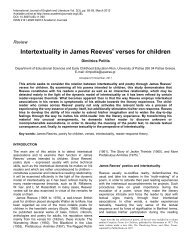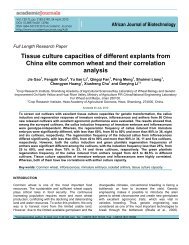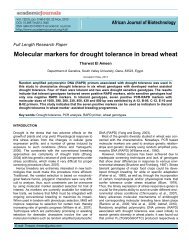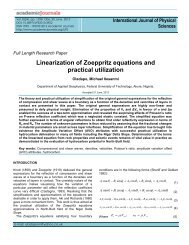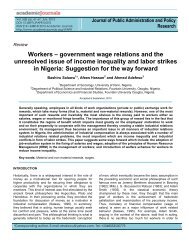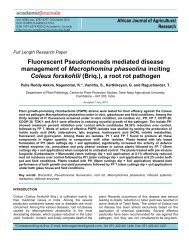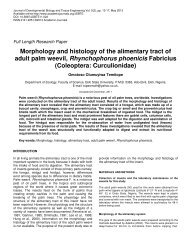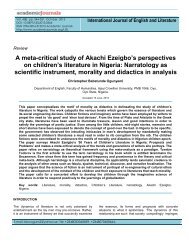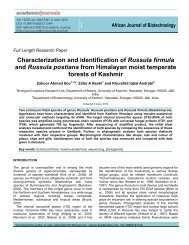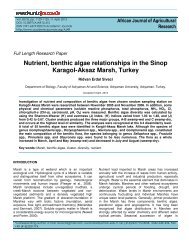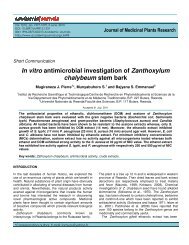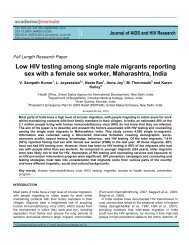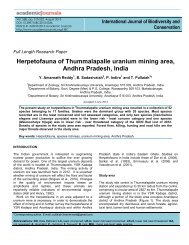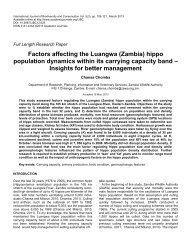Download Complete Issue - Academic Journals
Download Complete Issue - Academic Journals
Download Complete Issue - Academic Journals
Create successful ePaper yourself
Turn your PDF publications into a flip-book with our unique Google optimized e-Paper software.
Journal of Medicinal Plants Research Vol. 6(12), pp. 2504-2513, 30 March, 2012<br />
Available online at http://www.academicjournals.org/JMPR<br />
DOI: 10.5897/JMPR12.019<br />
ISSN 1996-0875 ©2012 <strong>Academic</strong> <strong>Journals</strong><br />
Full Length Research Paper<br />
Astragalus polysaccharides induced gene expression<br />
profiling of intraepithelial lymphocytes in immunesuppressed<br />
mice<br />
Lu Cheng 1 , He Xiaojuan 1 , Xiao Cheng 2 , Guo Yuming 1 , Zha Qinglin 1 , Liu Yuanyan 3 , Liu Zhenli 4 ,<br />
Chen Shilin 5 and Lu Aiping 1 *<br />
1 Institute of Basic Research in Clinical Medicine, China Academy of Chinese Medical Sciences, Beijing, China.<br />
2 Sino-Japan Friendship Hospital, Beijing, China.<br />
3 School of Chinese Materia Medica, Beijing University of Chinese Medicine, Beijing, China.<br />
4 Institute of Basic theory, China Academy of Chinese Medical Sciences, Dongzhimen, Beijing, China.<br />
5 Institute of Medicinal Plant Development, China Academy of Medical Sciences, Beijing, China.<br />
Accepted 22 February, 2012<br />
Astragalus polysaccharides (APS) possess a variety of immunomodulatory activities, but the regulation<br />
on mucosal immunity is not fully understood. In this study, immune suppression in mice was induced<br />
with cyclophosphamide treatment and APS was used as an intervention and was administrated at<br />
dosages of 3 g/kg (APS HD) and 1.5 g/kg (APS LD). Intraepithelial lymphocytes (IELs) were isolated from<br />
the intestines. The mRNA expressions from IELs in different groups of mice were detected using gene<br />
expression microarray to explore the gene expression profile of IELs, and what are the unique<br />
pathways related to low and high dosage of APS.<br />
Key words: Astragalus polysaccharides, mucosal immunity, intraepithelial lymphocytes, gene expression.<br />
INTRODUCTION<br />
The dried root of Astragalus mongholicus (Huangqi) has<br />
a long history of medicinal use in traditional Chinese<br />
medicine. Animal experiments and modern clinical trials<br />
have shown that A. mongholicus has excellent<br />
immunomodulating effects (Li, 1991). Even with the<br />
widespread use, a complete understanding of the<br />
biological effects and mechanisms regarding A.<br />
mongholicus has remained largely unknown. The active<br />
pharmacological constituents of A. mongholicus include<br />
various polysaccharides, saponins, and flavonoids.<br />
Among these, Astragalus polysaccharides (APS) have<br />
been most widely studied. APS might induce the<br />
differentiation of splenic DCs with enhancement of T<br />
lymphocyte immune function in vitro (Liu et al., 2011).<br />
Studies have also shown that APS enhances the<br />
immunological function of chicken erythrocytes (Jiang et<br />
al., 2010a). Moreover, APS can modulate the innate<br />
immune response of the urinary tract through inducing<br />
*Corresponding author. E-mail: lap64067611@126.com.<br />
increased TLR4 expression in vitro (Yin et al., 2010).<br />
Apart from these actions, our previous research<br />
suggested that regulation of the enteric mucosal immune<br />
response could be one of the important pathways for<br />
immune modulation by polysaccharides (Zhao et al.,<br />
2010). Likewise, we have demonstrated that herbal<br />
medicines have a modulating effect on the enteric<br />
mucosal immune system (Luo et al., 2010; Xiao et al.,<br />
2009).<br />
The mucosal surface of the intestinal tract is the largest<br />
body surface in contact with the external environment. It<br />
is a complex ecosystem generated by the alliance of<br />
gastrointestinal epithelium, immune cells and resident<br />
microbiota (McCracken and Lorenz, 2001). Intraepithelial<br />
lymphocytes (IELs), as the effector cells of the enteric<br />
mucosal immune system, play a multifaceted role in<br />
maintaining mucosal homeostasis (Ismail et al., 2009)<br />
and may be involved in protective cell-mediated immunity<br />
(Mowat et al., 1986). In general, administration of<br />
Chinese medicine to individuals is typically done orally,<br />
leading to intestinal uptake. Thus, there are extensive<br />
interactions between Chinese medicine and intestinal



